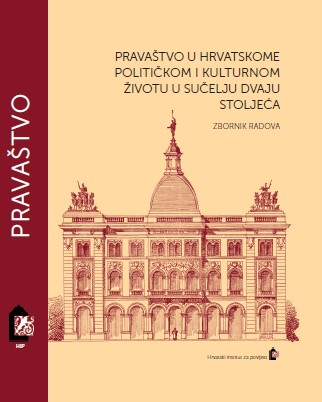Oblikovanje pravaške nacionalno-integracijske ideologije do hrvatskoga Sabora 1861. godine
The formation of ‘Rightist’ ideology of national integration up to the Croatian Sabor of 1861
Author(s): Jasna Turkalj
Subject(s): Political history, Government/Political systems, Political behavior, 19th Century
Published by: Hrvatski institut za povijest
Keywords: Party of Right philosophy; ideology of national integration; absolutist system; constitutional period; Ante Starčević; Eugen Kvaternik;
Summary/Abstract: In this work the author follows the formation of the Party of Right’s ideology of national integration during the period of neo-Absolutism in the 1850s, especially in the final phase of the breakdown of the absolutist system in 1859/1860 and the early stages of the beginning of the constitutional period, which coincided with the appearance of ‘State Right’ ideology and the emergence of national representatives Ante Starčević and Eugen Kvaternik in the Croatian Sabor (Parliament) of 1861. All of key elements of ‘Rightist’ ideology, which has at its heart the notion of a whole and fully independent Croatian state outside of the Habsburg Monarchy, were formed at this time. In the first full formulation of ‘Rightist’ thought, which Kvaternik presented in 1859 in the book La Croatie et la confédération italienne, he included within the Croatian state all land extending from the Adriatic Sea to the Danube and Drina rivers, from Soča in the north to Albania in the south, calling on the right of ‘original acquisition.’ All of the inhabitants of these lands acquired by original conquest he considered Croat. He also put forward the fundamental ‘Rightist’ concept of a constitutional agreement between the Habsburg Monarch and the Croatian people in 1527, which the Habsburgs had breeched thus allowing the Croat people the right to terminate this agreement and reconstitute an independent Croatian state and choose a new sovereign. Similarly Starčević, in petitions from the County of Rijeka, vehemently denounced Austria and the Habsburg dynasty and contested, like Kvaternik, any link to the people of the Monarchy other than that of a common sovereign, and demanded of Franz Joseph the creation of an independent and territorially whole Kingdom of Croatia. If the ruler did not accept these righteous demands, the Croatian people had the right and duty to break the agreement, that is, remove the Habsburgs from the throne. At the Sabor of 1861, Starčević and Kvaternik defended the principle of an independent and united Croatian state, acknowledging only the possibility of a personal union. The decision of the Sabor to not send a delegate to the Imperial Council to a discussion of common affairs with Austria both Starčević and Kvaternik considered a victory for their political principles.
Book: Pravaštvo u hrvatskome političkom i kulturnom životu u sučelju dvaju stoljeća
- Page Range: 19-67
- Page Count: 49
- Publication Year: 2013
- Language: Croatian
- Content File-PDF

